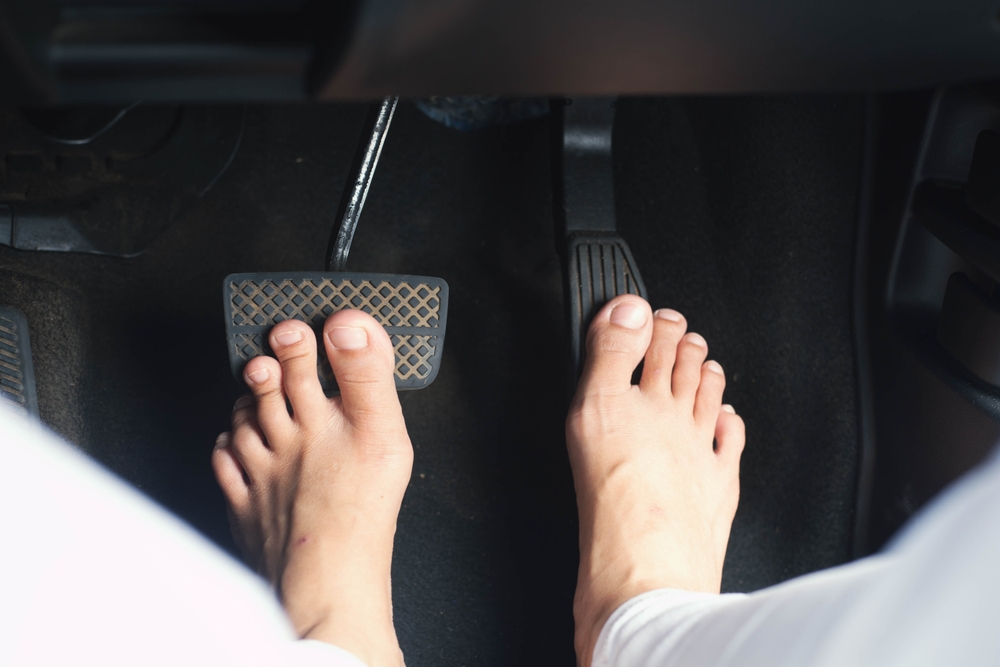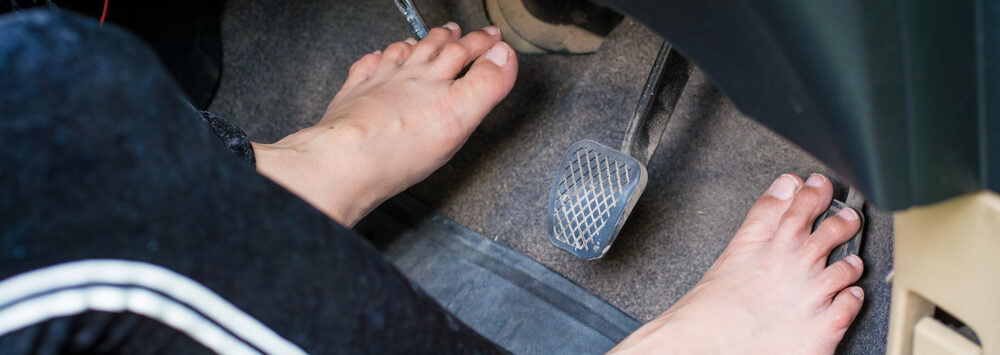
In the heart of the Sunshine State, where the climate is as inviting as the laid-back, beach-centric lifestyle, a frequently asked question bubbles up among both residents and visitors:
Is it illegal to drive barefoot in Florida? No, driving barefoot is not illegal in Florida. The state does not have any law prohibiting barefoot driving, but it is recommended to wear proper footwear to reduce the risk of accidents or injury due to reduced control over the vehicle’s pedals.
This question delves into broader concerns surrounding safety, legal stipulations, and the quintessential experience of shedding driving shoes for a more relaxed approach, exploring whether the seemingly innocuous act of driving without shoes or in flip-flops could inadvertently lead to legal or safety complications.
At Rosen Injury Law Firm, we aim to dispel myths, illuminate facts, and clarify the nuances of driving barefoot in Florida, the ramifications of not wearing shoes or sandals, and the importance of choosing proper footwear while navigating the roads.
Florida’s Legal View on Driving Barefoot
The belief that Florida law expressly forbids driving barefoot is a misconception. Similarly, no statute specifically outlaws driving without shoes, in flip-flops or sandals.
The lack of legislation directly addressing footwear (or the absence thereof) while driving indicates that, from a legal standpoint, it is permissible to either drive barefoot in Florida or while wearing diverse types of footwear in Florida.
Yet, this absence of explicit prohibition is not an endorsement of driving without suitable footwear. Appreciating the wider legal implications, particularly concerning reckless driving and the role of wearing appropriate footwear in avoiding traffic mishaps, is critical.
Safety Considerations and the Definition of Reckless Driving
Safety experts and law enforcement personnel consistently emphasize the risks associated with driving without appropriate footwear. Footwear designed for driving or that ensures a firm grip on the pedals can significantly bolster a driver’s control over the vehicle, an essential factor in emergencies requiring swift actions. In contrast, the use of bare feet or sandals may lead to diminished control, risking pedal slippage or delayed responses.
In Florida, reckless driving is defined as operating a vehicle with a willful or wanton disregard for the safety of persons or property. While driving barefoot or in flip flops isn’t inherently reckless or dangerous, such choices might be seen as contributing to reckless, dangerous or negligent behavior under certain conditions, particularly if they result in an accident.
Post-Accident Footwear Scrutiny
Following an accident, the vehicle driver’s footwear choice may come under investigation, especially if there’s evidence suggesting compromised vehicle control. Choosing shoes or specifically designed driving footwear could avert such scrutiny.
However, if an accident happens while the driver is barefoot or adorned in sandals, and this choice is believed to have played a role in the incident by police officer, the driver could be found at fault. This finding has significant legal and financial consequences, highlighting the importance of understanding Florida’s laws and the impact of footwear decisions on driving safety.
Victims of car accidents, or those involved in incidents while driving barefoot, should be keenly aware of their various legal options and avenues. Whether you’re heading back from the beach in sandals, driving home shoeless, or involved in a mishap with a barefoot driver, a well-informed perspective on the legal landscape is indispensable.
At Rosen Injury Law Firm, our expertise lies in offering detailed legal advice on car accidents, liability concerns, and the complexities of Florida’s statutes.
Advocating for Proper Footwear: A Safety Priority
While Florida’s statutes don’t mandate specific footwear for driving, opting for suitable shoes is a prudent safety measure. Shoes that fit your feet securely and offer solid grip can enhance pedal control and reduce accident risks. Though the law doesn’t restrict driving barefoot, selecting appropriate footwear is a proactive measure toward ensuring both personal and public safety on the roads.
Sandals and flip flops, particularly those lacking sufficient sole grip or that don’t secure well to the feet, risk getting caught under the brake pedal or gas pedal, leading to potentially dangerous situations. Similarly, driving in high heels or shoes with excessively thick soles can impair a driver’s ability to accurately gauge pedal pressure, increasing accident risks.

Legal Consequences and Driver Rights
Should barefoot driving or the choice of improper footwear contribute to an accident, navigating the legal ramifications can be intricate. The process of identifying the at-fault party, the potential for negligence claims, and the repercussions for insurance coverage and compensation are all influenced by the incident’s specifics, including the driver’s footwear choice.
Drivers and accident victims alike must grasp their rights and the possible legal outcomes of their footwear decisions. At Rosen Injury Law Firm, our mission extends beyond representing clients post-accident; we strive to educate and prevent accidents through informed decision-making and adherence to safety standards.
Steering Safely on Florida’s Roads
While not explicitly illegal, driving barefoot or with unsuitable footwear in Florida introduces a range of safety and legal considerations. At Rosen Injury Law Firm, our primary concern is ensuring drivers are not only legally protected but also well-versed in the safety implications of their footwear choices on the road.
As you enjoy Florida’s picturesque routes or its bustling city streets, the choice of what you wear on your feet can influence both your driving experience and your legal standing should an accident occur by vehicle.
If you require legal assistance, whether due to an accident as a barefoot driver, as a victim of such an incident, or simply in need of advice, Rosen Injury Law Firm is equipped to provide expert legal counsel specific to Florida’s legal environment.
Understanding the Risks of Bare Feet and Car Accidents
While Florida law doesn’t make it illegal to drive barefoot, there are inherent risks involved. In the event of a car accident, bare feet are more susceptible to injuries from broken glass, sharp debris, or the force of the impact. Wearing proper footwear offers protection for your feet, which is especially important if you need to exit your vehicle quickly in an emergency.
Furthermore, driving barefoot could raise concerns from a law enforcement officer responding to an accident. If your bare foot or the lack of protective shoes is perceived as a factor in the accident, you might be held liable. Even though there’s no law against driving barefoot, the officer responding may choose to issue a traffic ticket if they deem your footwear (or lack thereof) as contributing to unsafe driving.
Flip-Flops, Sandals, and Thin Soled Shoes
Similar concerns apply when choosing other types of footwear like sandals with thin soles. These can easily slip off your feet, potentially becoming wedged under pedals and hindering your ability to brake or accelerate. This presents a significant safety risk, especially in scenarios requiring sudden action.
The same applies to shoes with excessively thick soles as they can impede your ability to accurately feel the pedals of your car. If you are choosing driving shoes, opt for lightweight and comfortable ones that provide a good grip and allow sensitivity with the pedals.
Legal Ramifications: Negligence and “Willful or Wanton Disregard”
If an accident occurs while you are driving barefoot or wearing flip-flops, you might be considered negligent and found to be the at-fault party. Florida law states that reckless driving entails operating a motor vehicle with “willful or wanton disregard” for safety. Under certain circumstances, driving barefoot or with inadequate footwear could be interpreted by law enforcement as meeting this threshold of disregard.

What to Do if You Have an Accident While Driving Barefoot
If you’re involved in an accident while driving barefoot, it’s crucial to remain calm. If anyone is injured, call 911 immediately. Be prepared to answer questions from the responding officer about the circumstances of the accident. It may be helpful to mention that your choice of footwear did not impede your ability to operate the vehicle safely.
Protecting Yourself on the Road
The best way to avoid potential complications is to wear shoes while driving. Choose footwear that provides a firm grip, fits securely, and allows you to accurately feel the pedals of your car. Keep in mind that your big toe plays a vital role in braking and accelerating. Shoes protect your feet and offer better control.
While there’s no explicit law in Florida prohibiting driving barefoot, the choice of footwear can be influential should you be involved in a car accident. Always prioritize safety and choose appropriate footwear for the crucial task of operating a motor vehicle.
Need Legal Assistance? Reach Out to Us Today
Encountering a car accident in Florida, whether barefoot or otherwise, demands expert legal guidance. The seasoned team at Rosen Injury Law Firm is prepared to support you through the legal journey, safeguarding your rights and aiming for the compensation you rightfully deserve. Schedule a free consultation with us today and take a decisive step towards protecting your legal rights and peace of mind.
FAQs About the Question: Is Driving Barefoot Illegal in Florida
In what states are driving barefoot illegal?
Barefoot driving is not illegal. No state has laws against a driver wearing shoes. If you drive on foot you may lose control over your foot and may cause injury.
Why do people say it’s illegal to drive barefoot?
While no state has a law prohibiting people from driving barefoot, it remains a practice frowned upon in some places due to its lower safety.
Is it safe to drive barefoot?
While not illegal, driving barefoot carries some safety concerns. Bare feet are more vulnerable to injuries in an accident and could slip off the pedals, hindering your control of the vehicle.
Can I get a ticket for driving barefoot?
Although not directly illegal, if a police officer believes your lack of footwear contributed to an accident or unsafe driving, they might issue a ticket for reckless or careless driving.
If I get into an accident while driving barefoot, could I be held liable?
Potentially, yes. If the investigating officer determines that your lack of shoes contributed to the accident, you could face charges of negligence or reckless driving.
Does my insurance cover me if I have an accident while driving barefoot?
Most likely, yes. Insurance companies don’t usually specify footwear requirements. However, if your choice of footwear is deemed to have caused the accident, they may dispute your claim or raise premiums.
What does “willful or wanton disregard” mean in regards to driving?
This legal term implies that a driver knowingly acted in a way that demonstrated a disregard for the safety of others on the road. Under certain circumstances, driving barefoot could be interpreted as meeting this criterion.
